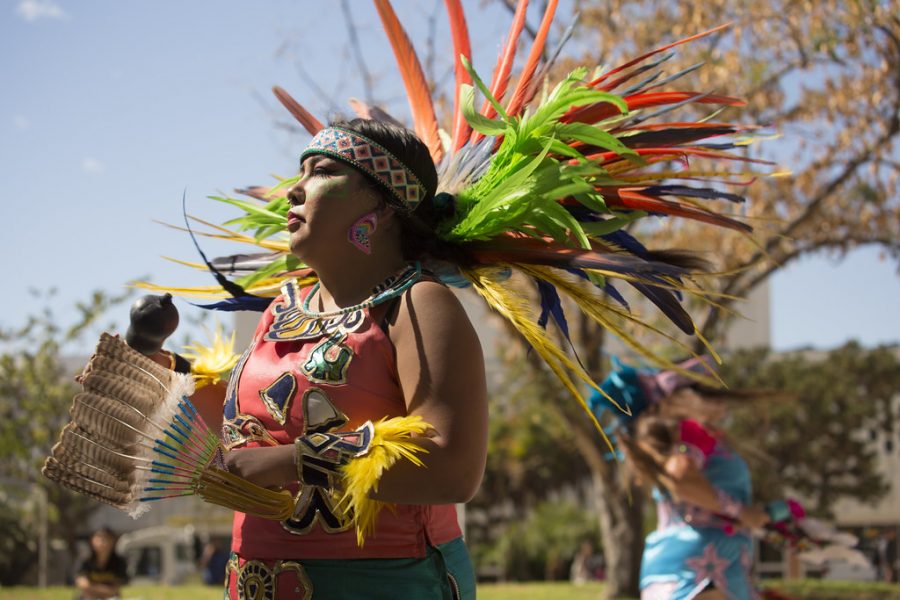Indigenous peoples deserve justice: stop celebrating Columbus Day
To celebrate Indigenous People’s Day, Cynthia Valquez performs with her Danza Azteca group “Xipe Totec,” named for the Mesoamerican god of spring. Danza Azteca refers to a modern indigenous dance tradition in Central Mexico based on the culture of the Chichimec and Otomi warrior tribes in the Aztec Empire.
October 13, 2020
Columbus Day and Indigenous Peoples’ Day coincide on the second Monday of October annually, with the former celebrating the arrival of Christopher Columbus in the Americas, and the latter functioning as an opposition to that holiday. Indigenous Peoples’ Day serves to celebrate the lives of Native Americans and their history, especially those marginally harmed by Columbus’s actions, and demonstrate the impact of those actions in the lives of Indigenous peoples today.
Columbus Day originated as a holiday in 1869, officially becoming a federal holiday in 1937, commemorating his voyage and arrival in the Americas in 1492. Many oppose the celebration and praising however, as he was credited with the mistreatment of many Native Americans and the cause of many of their deaths.
Upon his first landing in the Americas, Columbus wrote in his journal that he captured and enslaved six Native Americans, saying he believed they’d make good servants. This abuse continued as the international slave trade gained traction. Columbus sent thousands of Taino Native Americans, indigenous peoples of the Caribbean, from Hispaniola to Spain to be sold. Those not sent were kept and put to work for Columbus; he forced them to work on plantations and search for gold.
Only 60 years after Columbus landed in the Americas, the Taino population dropped from around 250,000 to a few hundred. Many died from the harsh work and amid the voyage to be sold into slavery. Additionally, 90% of the few hundred that remained were killed by smallpox and other diseases brought into their land. Today, the Taino people are considered extinct.
The most gruesome actions of Columbus often go unnoticed as they aren’t generally mentioned in his narrative, instead focusing simply on his voyage. During his time in what is now considered the Dominican Republic, he worked hard to deter rebellion and revolt with violence. Native Americans who tried to stand up for their people were killed, and Columbus ordered their dismembered bodies be paraded through the streets as a warning to others.
Besides the violence he purposefully enacted, he also released a new onslaught of disease across the New World, amounting to the mass killing of many Native Americans. He also helped further the notion of forcing religious agendas onto Native Americans; Columbus demanded they convert to Christianity and be rid of their cultures and beliefs, or face consequences of torture or death.
While Columbus is regarded as an important part of history, he is unworthy of having a holiday to commemorate his actions. The genocide of Native Americans and his mistreatment is often overlooked when recognizing Columbus Day, unintentionally glorifying what he’s done. In 1990, South Dakota officially renamed Columbus Day to be called Native American’s Day, and a year later, Indigenous Peoples’ Day was created.
The purpose is not to hide Columbus from history, but rather to bring his actions, and others’ from his era, to light as a means of honoring the people he persecuted. Indigenous Peoples’ Day offers an opportunity to educate people about the gravity of Columbus’s actions, and why they still matter in a racial and ethnic context. Additionally, it aims to honor Indigenous peoples who have been overlooked and deserve recognition.
Columbus Day should not be celebrated anymore; Indigenous People’s Day should fully replace it. People can still learn about Columbus without honoring him and glorifying the genocide and mistreatment he led and encouraged. In order to promote a more honest and respectful recounting of Columbus and his actions, it would be beneficial to transition to a holiday that promotes that and recognizes the importance of acknowledging the past so as to avoid those mistakes in the future.


Male (M) greer • Oct 10, 2022 at 4:58 pm
Columbus sailed to the new world, a feat worthy of a holiday. All people took slaves, and sold them for profit. No doubt, native americans also sold slaves to anyone that would trade. These are atrocities, common in those times.
Let me know? What ‘ great feat’ the native americans achieved? To be celebrated for?